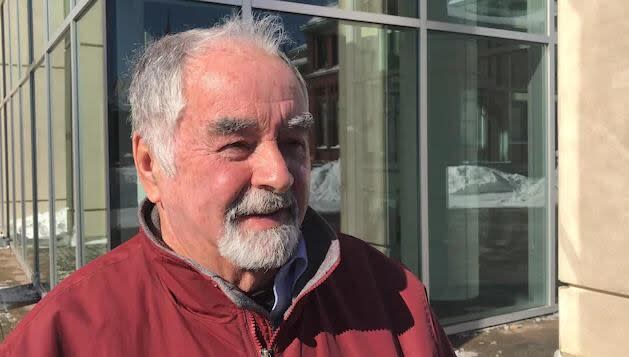Saint John council presses fight to get heavy industry paying more property tax

Saint John councillors expressed frustration again Monday night with the city's inability to spread more of the property tax burden to heavy industry.
"In our budget, our revenue from property tax is coming entirely from the residential taxpayers in Saint John," said Coun. Gary Sullivan, head of the city's finance committee. "And commercial and heavy industry are basically flat from one year to the next."
Sullivan presented a motion that the city write to the province and to other municipalities about tax reform, with the goal of achieving "sustainable and fair property tax revenue."
This was just the last step the city has taken in the past eight years to try to get more control over property taxation, and Sullivan said the province has provided "some tools" already. But but the job isn't finished, he said.

Coun. Gary Sullivan presented a motion to send a letter to the provincial government and municipal associations to give municipalities more control over property taxation. (City of Saint John)
He said other municipalities need to be educated about the issue, since they don't have heavy industry and don't feel the same pressure. The Saint John area has 60 per cent of New Brunswick's heavy industry, Sullivan said.
Coun. David Hickey said the uneven tax burden in Saint John should be "the top thing" the city talks about.
"We're passing a budget that puts a 10 per cent increase on residential taxes," HIckey said. "Heavy Industry's getting a discount. That's a story none of us can tell enough."
"It's got to be their priority coming in here every day, and it should be every MLA's priority when they head over the Petersville Hill" on Route 7, toward the city.

Coun. David Hickey says that heavy industry paying their fair share should be top priority for leaders. (Submitted by David Hickey)
The operating budget approved Monday has a four per cent reduction in the residential property tax rate.
But even with that reduction, increased property assessments mean the residential property tax class will pay nearly 10 per cent more next year than in 2023, while the non-residential class will barely pay about six-tenths of a per cent more. The heavy industrial class will pay about two per cent less.
Some councillors said they want to see Saint John residents care more about how they're taxed and they suggested putting together a flyer explaining the issue and putting it into everybody's mailbox.
"We need the citizens to help us get through to the province and the MLAs that we need that money that's generated in Saint John," Coun. Barry Ogden said.
"We're not asking for them to go raise money elsewhere. We're just saying let us keep the money that is generated in Saint John and make our lives better so we can grow."

Coun. Barry Ogden said that he wants to see money that is generated in Saint John stay in Saint John. (City of Saint John)
Coun. Gerry Lowe said the public doesn't understand the issue.
"They come and pay their taxes. We get an increase — heavy industry got a minus," he said.
While many of the councillors who spoke on the motion were critical of the provincial government, Sullivan was more even-handed.
"Last year, the provincial government did reduce their own provincial taxes on heavy industry to create some room for municipalities to move in and get more tax from industry," he said.
"And in the current budget, 2023, the City of Saint John did get more money from heavy industry."
The problem, Sullivan said, comes down to the 1.7 tax multiplier rule, which does not allow municipalities to tax any business properties, including industrial properties, more than 1.7 times the rate residential properties are charged

Liberal Gerry Lowe was declared the winner by just ten votes over Ogden in the September 24th election. (Radio-Canada)
"The province reduced the amount of heavy industrial tax by more than the City of Saint John could move into by moving the 1.7 slider," Sullivan said.
"Which meant that even though heavy industry in 2023 paid more to the City of Saint John, overall in 2023 heavy industry in Saint John still paid less on property tax."
With the maximum multiplier set at 1.7, municipalities are not able to fairly allocate the cost of inflation equitably across property tax classes, says the letter Sullivan proposed sending to the province and municipality groups..
The letter says municipalities in Newfoundland and Labrador, Prince Edward Island, Nova Scotia, Quebec, Manitoba, and Saskatchewan can set property tax rates without provincial restrictions.
Ontario, Alberta and British Columbia also have limits on property tax multipliers, but they're higher than Saint John's.
Council voted in favour of Sulllivan's motion.

 Yahoo News
Yahoo News 
